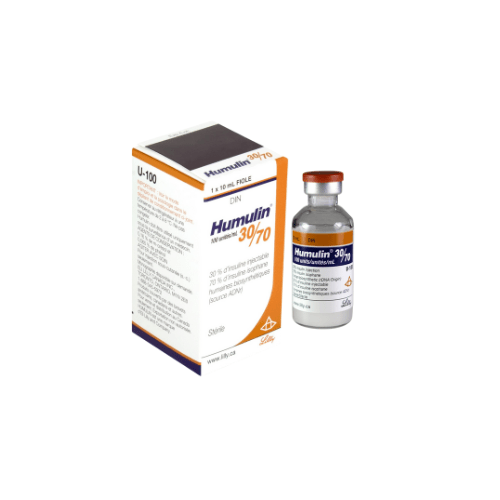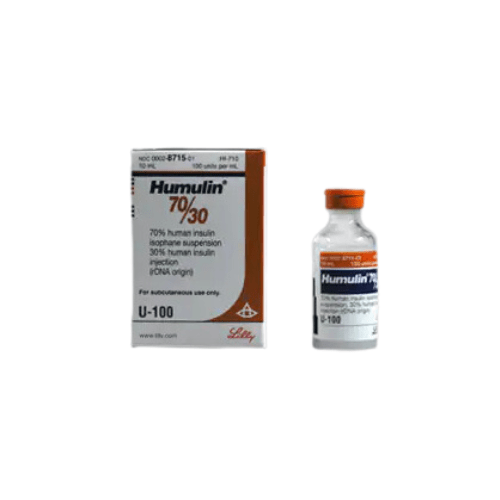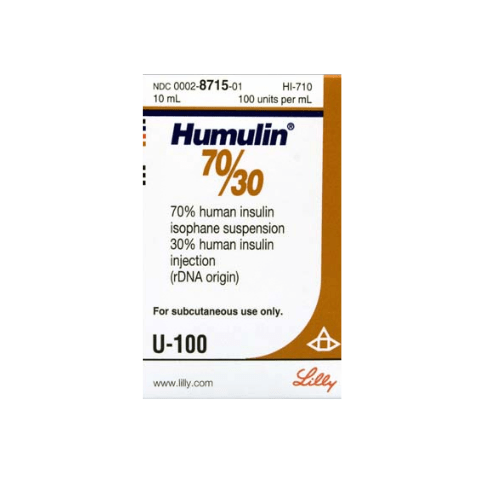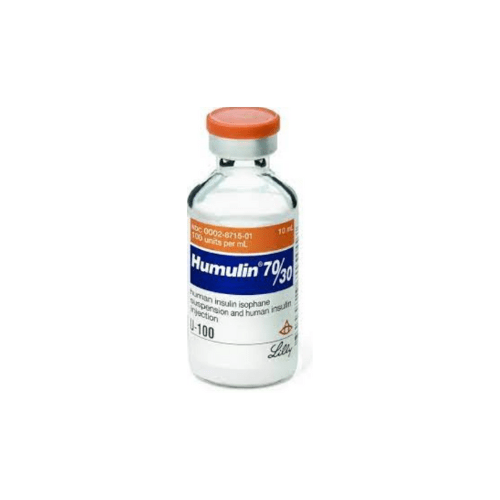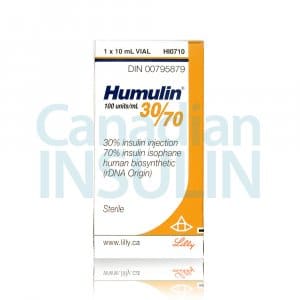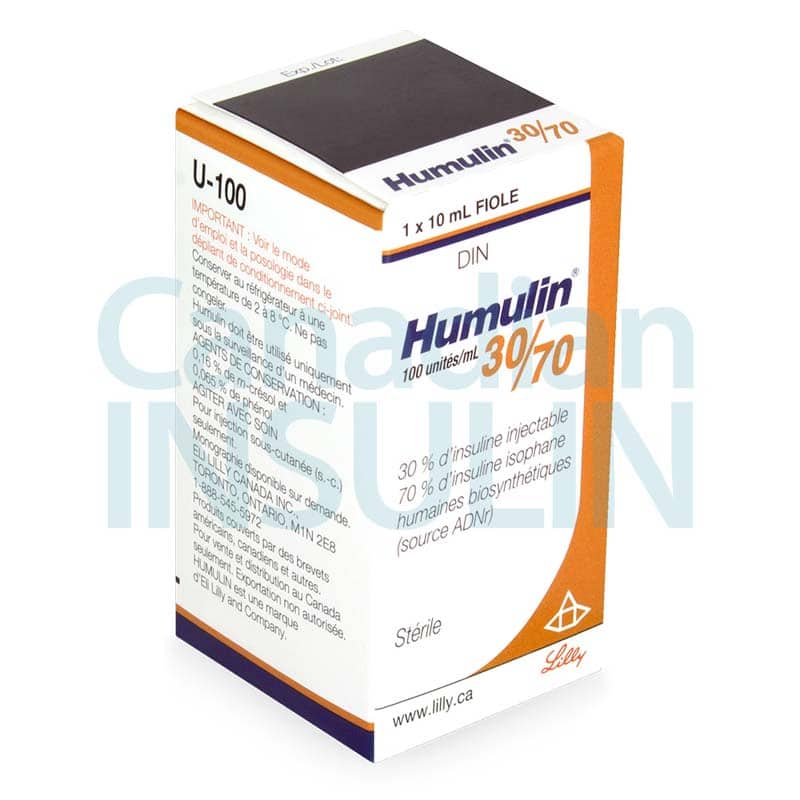Please note: a valid prescription is required for all prescription medication.
Humulin 30/70 Vial Uses, Safety, and Storage
Start 2026 with savings: Use code SAVE10 for 10% OFF all RX meds. Jan–1 Mar. Ozempic from Canada and Mounjaro Vial not included. Offer valid until March 1st. Coupon code cannot be combined with other offers. For products with “Bulk Savings”, the discount will be applied to the regular price for 1 unit. Maximum allowable quantity equal to a 90 day supply per single order.
Maximize your savings with Canadian Insulin: Buy 2 for a 10% discount, or stock up with 3 or more to unlock an incredible 20% off on your insulin needs.
$59.99
You save


What Humulin Vial Is and How It Works
Humulin 30/70 Vial is a premixed human insulin used to help lower blood glucose in diabetes mellitus. It combines intermediate-acting NPH insulin and short-acting regular insulin in one product. This page summarizes how the mix works, common handling steps, and key safety points to discuss with a clinician.
Some patients explore Ships from Canada to US when comparing cross-border pharmacy pathways for ongoing insulin therapy. When needed, prescription details are confirmed with the prescriber. In practice, this medicine is designed to cover both mealtime needs and background insulin needs, but it is not the same as a rapid-acting insulin analog.
The “30/70” mix refers to the proportion of regular insulin (short-acting) and NPH insulin (intermediate-acting). Regular insulin tends to start working sooner and targets post-meal glucose, while NPH has a later, longer effect that supports between-meal and overnight control. Because NPH is a suspension (tiny particles suspended in liquid), the vial typically looks cloudy and needs gentle re-suspension before dosing.
Why it matters: Premixed insulin can simplify injections, but timing and consistency still matter.
| Component | What it helps with | Practical note |
|---|---|---|
| Regular insulin | Mealtime glucose rises | Often taken before meals per prescriber plan |
| NPH insulin | Between-meal and overnight glucose | Cloudy suspension that must be mixed gently |
Who It’s For
This premixed human insulin is prescribed for people with diabetes who need insulin therapy to help manage blood glucose. It may be used in type 1 diabetes and type 2 diabetes, depending on the overall regimen and clinical goals. Many clinicians consider premixed insulin when a simpler schedule is preferred over separate basal and bolus injections, or when consistent meal patterns make fixed ratios workable.
Humulin mixtures are not used to treat episodes of hypoglycemia (low blood sugar) and should not be taken when blood glucose is already low. Anyone with a known serious allergy to insulin or product ingredients should avoid it. To browse related condition hubs, see Diabetes Condition and Type 2 Diabetes, and for broader education topics, Diabetes Articles.
Extra caution is often needed in people with kidney or liver impairment, older adults, and anyone with a history of severe hypoglycemia. During acute illness, appetite changes, or major activity changes, glucose patterns can shift quickly, so monitoring plans may need adjustment by the prescriber.
Dosage and Usage
Dosing for Humulin 30/70 Vial is individualized and based on factors like glucose readings, meal timing, activity, and other medicines. Premixed products are commonly prescribed on a set schedule linked to meals, often more than once daily, but the exact timing and number of injections depend on the regimen chosen by the prescriber. Do not change your dose or schedule without clinician guidance.
This insulin is typically injected subcutaneously (under the skin) using a U-100 insulin syringe that matches the product concentration. Because it contains NPH, the vial should be gently rolled and inverted until the liquid looks uniformly cloudy; avoid vigorous shaking. Inspect for clumping, frosting on the glass, or particles that do not re-suspend, and do not use the vial if the appearance seems abnormal.
General technique steps include cleaning the rubber stopper, using a new sterile needle and syringe, and rotating injection sites to reduce lipodystrophy (fatty tissue changes under the skin). Humulin mixes are not meant for intravenous use, and they are generally not used in insulin pumps unless a prescriber specifically directs otherwise. Glucose monitoring and a clear plan for treating hypoglycemia are standard parts of safe use.
Strengths and Forms
Humulin 30/70 Vial is supplied as a multi-dose vial intended for use with U-100 insulin syringes. Product labeling and naming conventions can vary by country; in some regions, the same concept may be described as a 70/30 mixture, reflecting that NPH is the larger fraction. Always confirm the exact product name, ratio, and concentration printed on the pharmacy label.
Many vials in this class are U-100 (100 units/mL) and commonly come in a 10 mL presentation, but availability can vary by jurisdiction and pharmacy supply. If you use vision aids, consider tools like syringe magnifiers or clinician training to reduce dosing errors. Keep a current medication list available for every visit, especially when other glucose-lowering medicines are started or stopped.
Storage and Travel Basics
Store insulin according to the package insert and the pharmacy label. Unopened vials are typically kept refrigerated at 2–8°C and protected from heat and light; do not freeze, and discard any insulin that has been frozen. Once in use, some insulin products may be kept at controlled room temperature for a limited time, but the allowed duration differs by product and region, so rely on the specific labeling you received.
Humulin 30/70 Vial contains NPH, so appearance checks are part of storage safety. After gentle mixing, the liquid should look evenly cloudy; persistent clumps or crystals can indicate the insulin is not usable. Keep vials away from direct sunlight, heaters, and hot cars, since temperature extremes can reduce potency even if the vial looks normal.
Quick tip: When traveling, carry insulin with you and use an insulated bag with a cool pack that does not touch the vial.
For air travel, keep supplies in a carry-on and consider bringing a copy of the prescription. If you use a continuous glucose monitor or a meter, pack extra sensors, strips, and batteries. If a power outage affects refrigeration, a pharmacist can help interpret storage limits based on the label and the temperatures reached.
Side Effects and Safety
The most common risk with any insulin, including Humulin 30/70 Vial, is hypoglycemia (low blood sugar). Symptoms can include sweating, shakiness, hunger, headache, confusion, irritability, or unusual fatigue. Severe hypoglycemia can lead to seizures or loss of consciousness and requires urgent help.
Other possible effects include weight gain, injection-site redness or itching, and swelling of hands or feet. Repeated injections in the same area can cause lumps or dents in the skin, which may change absorption. Allergic reactions are uncommon but can be serious; seek emergency care for trouble breathing, widespread rash, or facial swelling.
Why it matters: Recognizing early low-glucose symptoms can reduce the chance of severe events.
Insulin can also lower potassium in the blood (hypokalemia), particularly in susceptible patients or during high-dose treatment, which can affect heart rhythm. If you take thiazolidinediones (such as pioglitazone), combined use with insulin may increase the risk of fluid retention and heart failure symptoms; clinicians may monitor for shortness of breath or rapid weight changes. Regular review of glucose logs, hypoglycemia episodes, and injection technique supports safer long-term use.
Drug Interactions and Cautions
Many medicines can change insulin needs by increasing or decreasing glucose levels. Corticosteroids, some diuretics, thyroid hormone changes, and certain antipsychotics may raise glucose, while other agents can lower it. Alcohol can also increase the risk of hypoglycemia, especially when combined with missed meals.
Some drugs can mask typical low-glucose warning signs. Beta-blockers, for example, may reduce tremor and palpitations, which means sweating or sudden fatigue might be the more noticeable symptoms. Discuss any history of hypoglycemia unawareness with a clinician, since it can affect monitoring plans and driving safety.
Illness, vomiting, diarrhea, and changes in eating patterns can shift glucose control quickly. Kidney or liver impairment may slow insulin clearance, increasing hypoglycemia risk. If other injectable diabetes therapies are added, clinicians often adjust the overall plan to reduce overlapping effects and to clarify what to do when meals are delayed.
Compare With Alternatives
Humulin 30/70 Vial is one way to deliver both basal-like and mealtime insulin coverage in a fixed ratio. A common alternative is a split regimen using separate NPH insulin and regular insulin, which can allow more flexibility in adjusting the mealtime and background components independently. Another approach is a basal insulin analog plus rapid-acting insulin at meals, which may better match variable eating schedules for some people.
For some patients with type 2 diabetes, non-insulin medicines can reduce insulin needs or delay intensification, depending on clinical status. If you are reviewing broader therapy categories, these resources may help with background context: Mounjaro Vial Dual Action, Rybelsus Semaglutide Overview, and Semaglutide Dosage Chart.
Premixed insulin analog products also exist, often as pens, and they differ in onset and meal timing. The best comparison depends on your glucose patterns, ability to match dosing to meals, hypoglycemia history, and comfort with multiple daily injections. A clinician can explain which regimen aligns with your monitoring data and daily routine.
Pricing and Access
Access to Humulin 30/70 Vial depends on prescription requirements, local regulations, and pharmacy supply. Insurance coverage and formularies can affect which insulin types are preferred, and some plans require documentation such as prior authorization. For people paying out of pocket, cash-pay policies and pharmacy dispensing rules can vary, and costs may differ without insurance.
Dispensing and fulfilment are handled by licensed partner pharmacies, where permitted. In cross-border situations, documentation needs and eligibility checks may differ by jurisdiction, and the prescriber may be asked to confirm the current regimen. If you are comparing medication classes and options, you can also browse the Diabetes Medications hub to see related therapies by category.
It can help to confirm the exact insulin name, concentration (U-100), and vial size on the prescription, since mix ratios can be written in different formats. Ask the pharmacy how refills are documented and what to do if a vial arrives warm or appears unusual. For general, non-time-limited updates that may affect access pathways, see the Promotions Page.
Authoritative Sources
For the most reliable product-specific details, use the official labeling supplied with your vial and the pharmacy label instructions. If you want to review prescribing language and safety information, a neutral reference is the DailyMed database, which republishes FDA labeling. For practical storage reminders, diabetes organizations also provide patient-centered handling guidance.
For labeling and administration details, consult DailyMed listing for Humulin 70/30 products. For general storage and handling principles, see American Diabetes Association insulin storage guidance.
Where permitted, partner pharmacies may use prompt, express, cold-chain shipping to help maintain temperature control.
This content is for informational purposes only and is not a substitute for professional medical advice.
Express Shipping - from $25.00
Shipping with this method takes 3-5 days
Prices:
- Dry-Packed Products $25.00
- Cold-Packed Products $35.00
Standard Shipping - $15.00
Shipping with this method takes 5-10 days
Prices:
- Dry-Packed Products $15.00
- Not available for Cold-Packed products
What does 30/70 mean on this insulin?
A 30/70 premixed insulin contains two types of human insulin in a fixed ratio: 30% regular insulin (short-acting) and 70% NPH insulin (intermediate-acting). The ratio is meant to provide both mealtime coverage and longer background coverage. Naming can look different across regions, and some labels describe the same idea as 70/30 to emphasize the NPH portion. Always verify the exact product name, ratio, and concentration on the pharmacy label and the carton.
When is premixed human insulin usually taken?
Premixed human insulin is commonly scheduled around meals because it includes a short-acting component. Many regimens use it once or twice daily, often before breakfast and/or before the evening meal, but exact timing depends on the individualized plan and glucose patterns. Because regular insulin does not act as quickly as rapid-acting analogs, meal timing instructions can be important. Follow the prescriber’s directions, and use glucose monitoring to understand how meals and activity affect readings.
How do I prepare a cloudy insulin vial before injecting?
Products containing NPH insulin are suspensions, so the vial often appears cloudy. Before drawing up a dose, gently roll the vial between your palms and slowly invert it several times until the liquid looks uniformly cloudy. Avoid vigorous shaking, which can create bubbles and make dosing harder. Inspect the vial after mixing; do not use it if you see clumps, frosting on the glass, or particles that do not re-suspend. Use a U-100 syringe that matches the insulin concentration.
What signs of low blood sugar should I watch for while using insulin?
Low blood sugar can start with sweating, shakiness, hunger, headache, dizziness, irritability, or a fast heartbeat. As it worsens, confusion, slurred speech, poor coordination, or unusual sleepiness can occur. Severe hypoglycemia may cause seizures or loss of consciousness and needs emergency care. Some medicines, including beta-blockers, can mask early warning symptoms. Ask your clinician for a written plan on how to treat lows, when to recheck glucose, and when to use glucagon or call for help.
Can I mix premixed insulin with another insulin in the same syringe?
In general, premixed insulins are designed to be used as-is, and mixing them with other insulins can change how they work. Combining products may also increase the risk of dosing errors, especially if the other insulin has a different onset or concentration. There are limited situations where clinicians may direct specific mixing steps, but those instructions are individualized. If you think you need more flexibility than a fixed 30/70 ratio provides, discuss regimen alternatives rather than experimenting with mixing.
What should I ask my clinician before switching from another insulin?
Ask how the new insulin’s timing relates to meals, what glucose targets and monitoring frequency are expected during the transition, and what to do if you miss a meal or have unexpected activity. It is also reasonable to ask about hypoglycemia risk, especially overnight, and whether kidney or liver issues affect dosing. Confirm whether your syringes match the insulin concentration (U-100) and review injection technique and site rotation. If you use other diabetes medicines, ask how those fit into the new plan.
How should I store an insulin vial during travel or a power outage?
Keep insulin within the temperature range listed on the product insert and pharmacy label, protecting it from freezing and high heat. During travel, carry the vial with you and use an insulated container with a cool pack that does not directly touch the insulin. Avoid leaving insulin in a hot car or in direct sunlight. In a power outage, note how long the refrigerator was off and how warm it became; a pharmacist can help interpret whether the vial remains usable based on labeling limits and exposure.
Rewards Program
Earn points on birthdays, product orders, reviews, friend referrals, and more! Enjoy your medication at unparalleled discounts while reaping rewards for every step you take with us.
You can read more about rewards here.
POINT VALUE
How to earn points
- 1Create an account and start earning.
- 2Earn points every time you shop or perform certain actions.
- 3Redeem points for exclusive discounts.
You Might Also Like
Related Articles
Zepbound Pill Clarified: Injection Reality and Oral Research
Key Takeaways Current form: Zepbound is an injectable medicine, not a tablet. Search intent: “pill” usually means convenience, not a new product. Dosing language: labels use stepwise titration and maintenance…
Lancets For Blood Sugar Testing: Selection And Safety Tips
OverviewFingerstick blood glucose checks rely on small, sharp tools and consistent technique. In most home setups, a spring-loaded lancing device uses lancets to puncture skin and produce a drop of…
SGLT2 Inhibitors Explained: Uses, Risks, and Examples
Key Takeaways These medicines lower blood sugar by acting in the kidneys. Some are also labeled for heart failure or chronic kidney disease. Drug names include dapagliflozin, empagliflozin, and canagliflozin.…
Out Of Pocket Cost For GLP-1 Medications: Planning Tips
Key Takeaways Costs vary by drug, indication, and dose form Cash-pay totals include more than the pen Programs exist, but eligibility is limited Be cautious with compounded versions and unverifiable…

